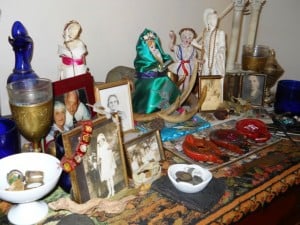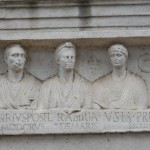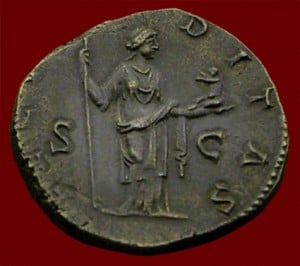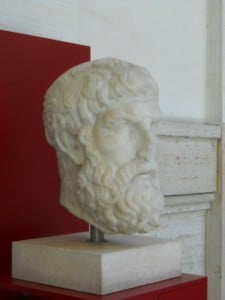A second point of discussion on the beliefs of cultores Deorum stated “That our Gods and Goddesses are benevolent and parental towards humans” This was followed by another point, “That the Gods do take an interest in human affairs and in the lives of Their individual worshippers in the same manner as parents hold an interest in their children.”
Again, it is implicit from ritual practice that there is an underlying belief that the Gods take an interest in our actions, that They respond to our ritual actions, and that the Gods therefore must take an interest in human affairs. Belief in the efficacy of ritual is true for most religions, and it naturally follows, therefore, that worshipers believe that divine Beings must take interest in human affairs.
Some bloggers have taken exception, however, to the statement characterizing Their interest in us as parental in nature. This statement, however, is based upon a quote from Varro (frag. 47 Card.). “The superstitious man fears the Gods, the religious man reveres Them as he would his parents, for They are good, more apt to spare than to punish.” Cicero as well, and other Roman authors, also speak of the Gods in terms of having a parental attitude towards us, and in many prayers Gods are addressed as Pater and Goddesses as Mater. Some of the elite members of Roman society took this a step further in claiming that their family descended from a God or a Goddess, or else from a hero. The Founders of Rome, Romulus and Remus, were claimed to have been the sons of Mars. Rex Servius Tullius, the sixth king of Rome, was likewise thought to have had a divine ancestor. The Iulii, as another example, claimed to have descended from Venus, through Aeneas’ son, Iulus. Philosophically this concept went still further, viewing all men and women as children of the Gods.
Our Stoic Seneca the Younger wrote, “God is near you, with you, within you. I say it, Lucilius, a holy spirit sits within us, spectator of our evil and our good, our guardian (Ep. 41.12).” He refers to the genius within every man, and to the juno possessed in every woman. Aufustius, quoted by Festus, said that “the genius is the son of Gods and human parents (GRF 2),” posing, therefore a basic tenet of the religio Romana that we are all children of the Gods. There is ample evidence that our ancient forebearers thought of the Gods as having a “parental” interest in human affairs.
Some modern commentators on the religio Romana, coming from different traditions, quibble over terms if not this view itself. They see the Gods as benevolent and our relationship with the Gods as patrons to human clients rather than being a kind of parental relationship. This could be due, I suppose, to our different experiences with parents and with patrons; certainly a difference between modern experience from those of our ancient ancestors. I don’t think that all apprentices, as Rufia Prisca uses in her examples, would hold their Gods in the same relationship they have with their mentors, and I know that artists don’t always have ideal relationships with their patrons. So they might look differently on this patron-client relationship, and instead describe their relationships with the Gods in other terms. You can read her thoughts on this and other topics related to the religio Romana at her blog http://titarufiaprisca.wordpress.com/
Secondly, there is some difference as well between the modern conception of a God and what our ancient ancestors thought. First, modern people conflate their concepts of the divine, probably due to the influence of monotheistic traditions. The ancient Romans, having a multitude of Gods, and a variety of types of deities, divi, and semi-divi, had a number of terms to describe the divine. They held a whole different perception, so we cannot attribute only one sort of relationship that cultores Deorum would have with their own Gods today.
These terms we use to describe our relations with the Gods may be important in distinguishing how we as humans individually perceive our relationships. It may also have something more to say about the human relationships we have had, than about our relationship with any Goddess or God. It is important to remember that these are human ideas being projected unto the Gods, rather than relating anything about the Gods Themselves. A phrase so often misused today, but it does come down to the personal relationship that one develops with his or her Gods and Goddesses. And there is certainly a wide range of relationships available for people to develop with the multitude of deities, just as we would with the multitude of people we meet.
At his blog, http://ursus.dreamwidth.org/ Ursus dismisses the idea that the Gods provide individuals with a destiny. He says, “If you conquer Gaul like Caesar or Persia like Alexander, then I’ll believe you.” But why assume that only very few people are given a destiny? If the Gods grant a destiny to Aeneas to survive the fall of Troy and to found a new city in the west, wasn’t it also the destiny of others to perish in the defeat of his city of Troy, and also the destiny of some men to become herdsmen, weavers, potters, soldiers and fishermen? We can’t all be Caesar or Alexander. Ursus also dismisses the Hellenes who speak to their Gods on personal issues of sexual identity. Well, some things we inherit, with DNA acting as an instrument of destiny, and some things just seem to occur from a toss of the dice with fickle Fortuna adding in Her influence at the intersection of the determinist and indeterminist worldviews. A person is whatever the Gods and Nature have determined him or her to be, and no one ought to be dismissed for their sexual orientation, or their gender, for their race, nationality, or ethnic origin, for their social status, or for any other superficial difference due to birth rather than by choice. A person ought to be judged on their actions. Looking at this from the view of a devotee, why wouldn’t a woman or a man speak to their Gods about their personal problems, no matter what these are or would be? And why wouldn’t you want to develop that kind of rapport and relationship where you meet your Goddess as an understanding parent? Rather than become dismissive of another person’s approach to his or her Goddesses and Gods, perhaps we should think that we may have limited our own relationships by not working with the divine in other ways.
Interestingly, Ursus also dismisses as absurd those “pagans (who) describe their relationship to their gods in terms of erotic love and carnal possession.” Didn’t Katherine of Siena describe her relationship in terms of a sacred marriage with Jesus? Has not others, from assorted traditions of East and West described their ecstatic experiences in terms that are often erotic and is not “carnal possession” precisely what is meant by divine inspiration? In the former one’s Authentic Being is said to leave the physical body ek statis, while being filled with a holy spirit, in spiritu, indeed would have, as the later describes, possession of the body taken temporarily as an abode of a spiritual being. Most importantly for a cultor Deorum Romanorum, the founder of the Religio Romana and its law giver, Numa Pompilius, was said to have introduced the ritual sacrifices, established the collegial institutions, and erected temples all at the suggestion of the nymph Egeria with whom he would meet in dreams. So closely was his relationship with Egeria that some thought her to be his wife. There is an implied carnal sort of relationship in that, erotic, too, but in a metaphorical sense, just as has been used by shamans and mystics of all traditions to describe their own relationship with the Gods. The Gospel of Philip makes the hierogamos as a central allegory in one form of early Christianity, and like Katherine other Christian mystics spoke of being wed to their Gods. In the ancient world the hierogamos took on a ritual act, rather than simply an allegory, with a sacerdos standing in for the God or Goddess. Shiva creates the world in erotic love and carnal possession of Shakti. The Hermetic Poimandres describes the divine descending in a love embrace. And in our own tradition, Diana Lucina took Her mortal lover, Cybele Hers, as Mars and Jupiter, and Vulcanus took Theirs in the myths that express how some relate to their Gods. Such stories, both modern and ancient, are illustrative descriptions of what is possible on an emotional level in a personal relationship with the divine, and should not be dismissed as literal impossibilities.
This is an interesting issue brought up by Ursus’ comment not only because of the legendary origin of the religio Romana being inspired in a sacred marriage, but also because of how some modern practitioners speak of their conversion to our tradition. Like Paul on the road to Damascus, Antonia related how she had a vision while riding in an automobile, and although not knowing who this was with Whom she met, she was led by her Goddess to the Gods of Rome. Others have spoken of being drawn to the Gods of ancient Rome without having had any visions. But one I found particularly interesting was a women in her later years. Having been raised in Judaism, Sempronia had no experience of visions. She was especially surprised then to attain a vision of Minerva while in ritual after ninety years of life. Visions, of course, are not the same as an ecstatic experience, so they are not described in the same intense terms. But there are some modern cultores Deorum who have experienced a more personal, even erotic kind of encounter with the Gods. I don’t find it at all surprising that our experiences of the Gods in the modern world should be similar to what our traditions tell us have happened with others in the past. It is a human experience to come upon the Gods. Different religions may describe these encounters according to their own traditions, whether Vishnu or a Lady at Fatima, but the fact is that there is more in common in these human encounters with the Gods than modern religions can separate out. Everyone ought to be able to go beyond the limits of their own religious tradition to recognize that humans in all ages, in all places and all civilizations, no matter their religious tradition, have encountered the Gods in much the same way. Dismissing such experience really only limits yourself and inhibits the kind of personal relationships you can develop with the Gods.
This goes back to the second cause I mentioned above – the modern conception of what a god is. The single feature that distinguished the religio Romana from other ancient religions of the Mediterranean was its focus on the family. It was not a religion of the Greek polis or of a Hebrew tribe, or one of the Egyptian nomes. Rome had its state religion, to be sure, but one that grew out of the religious traditions of the Roman families. Central to the religio Romana is the cultus for the Lares, and the Lares can best be explained as our ancestors and as the beneficial spirits of deceased members of our communities. The core of the religio Romana may be described as ancestor worship. There are aspects to this particular family cultus that parallel ancestor worship in other religious traditions. There is also an element of spiritualism in the Roman tradition as we seek the advice of our Lares. So in a very real sense, these minor gods are family members and our relationship with the Lares is one that is parental in nature. Other minor deities of the land may not have a parental relationship with us. We share the earth with many creatures, plants and animals, as well as semi-divine and divine creatures. So our relationships with them might be described more as neighborly than parental. There are, too, some deities who are invoked when doing certain tasks, and thus could be said to be a patron of our labors. When sweeping we might invoke Intercidona, Hercules during athletic contests and in dancing, Seia, Tutelina, and Segesta when laboring in the fields, Minerva in household crafts and for special skills, as well as when studying mathematics. Castor was a patron of horsemen, and His mortal brother Pollux a patron of boxers, with both held as patrons of sailors, merchants and cobblers. In the state religion a tutelary Goddess protected the City, and Jupiter was regarded as the patron deity of the Res Publica. So many Gods and Goddesses were related to as patrons, even thieves, liars, orphans and prostitutes had their patron deities, as slaves had Feronia as their patron Goddess, and gladiators held Hecate as their own patron. And then there are all the Gods above and below, in the heavens and in the seas, and there are the more cosmic deities, and the Di Involuti even higher still. With such a diversity of spiritual beings, and such a variety of different kinds of Goddesses and Gods, it should not be surprising that we develop a wide variety of relationships with our deities. To say that the Gods feel parental towards us may relate to one type of relationship alone, and perhaps a preferred relationship with a personal God or Goddess, among the many possible relationships people have with their many Goddesses and Gods. Dismissing that kind of parental relationship, though, only limits what sort of relationship you can develop by placing it outside the possible encounters you may have with your own Gods.
Like everyone else, I look back on my childhood for examples of the relationships my relatives had with their deities. Nonna’s was rather personal, and emotional. When her prayers and sacrifices were not met, she would punish Their images by standing these on their heads, in a dark corner, away from her altars, with their faces turned to the wall as if they had been disobedient children. My mother, however, kept a friendly relationship with her main God, dressing His image in fresh robes that she would make by hand, sharing her favorite novels with Him, bringing Him little gifts each day, as her mother did. But unlike nonna, she did not ‘punish’ Him or His image if He didn’t respond favorably. In fact, I don’t think she even asked for things from Him as nonna would do, because her relationship with Tagesu was so different. Bisnonna Francesca was more grateful for gifts she received while foraging, rather than ask for what she did not have. And granpa was always sharing his own bounty with Giove as with a personal friend. That was my mother’s side of the family. My father’s side was a bit different, each developing their own kind of personal relationships with the Gods. I have likewise developed different relationships over the years, meeting different Gods and Goddesses in different stages of my life. Some have been very personal. One could even be described in erotic terms. But each has been unique, and I would say that those with Whom I am closest and with Whom I have had a relationship for the longest time have been parental relationships as They have guided me through life.











